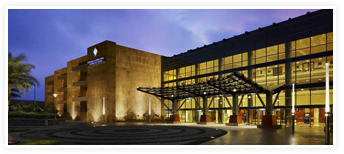Panel 1: March 30, 15:30-17:00 pm
Title: The Computer is the new Sewing Machine: Benefits and Perils of Crowdsourcing
Moderator: Praveen Paritosh, Google
Participants:
- Matt Cooper, oDesk
- Panos Ipeirotis, NYU
- Sid Suri, Yahoo! Research
There is increased participation by the developing world in the global manufacturing marketplace: the sewing machine in Bangladesh can be a means to support an entire family.
Crowdsourcing for cognitive tasks consists of asking humans for questions that are otherwise impossible to answer by algorithms, e.g., is this image pornographic?, are these two addresses the same?, what is the translation for this text in French?. In the last five years, there has been an exponential growth in the size of the global cognitive marketplace: Amazon.com's Mechanical Turk has an estimated 500,000 active workers in over 100 countries, and there are dozens of other companies in this space.
This turns the computer into a modern-day sewing machine, where cognitive work of various levels of difficulty will pay anywhere from 5 to 50 dollars a day. Unlike outsourcing, which usually requires college education, competence at these tasks might be a month or even less of training. At its best, this could be a powerful bootstrap
for a billion people. At its worst, this can lead to unprecedented exploitation.
In this panel, we discuss the technical, social and economic questions and implications that a global cognitive marketplace raises.
Panel 2: March 31, 15:30-17:00 pm
Title: Social Media: Source of Information or Bunch of Noise
Moderator: Amr El Abaddi, UC Santa Barbara
Participants:
- Lars Backstrom, Facebook
- Soumen Chakrabarti, IIT Bombay
- Alejandros Jaimes, Yahoo! Research Barcelona
- Jure Leskovec, Stanford
- Andrew Tomkins, Google
Abstract:
Social media has witnessed an explosive growth in the past few years. Wikipedia has over 3.5 million pages with descriptions of entities. Flickr members have uploaded over 5 billion photos,You Tube has 35 hours of videos uploaded to the site each minute, and Twitter users generate 65 million tweets a day.
While some forms of social media like Wikipedia clearly have valuable information embedded in them, the jury is still out on other forms like tweets, comments, and social network (e.g., Facebook) updates. Some of the key questions that the panel will debate include:
- Is there useful information in social media like tweets?
- How to extract structured records from unstructured user-generated content like reviews?
- How to sift through the vast amounts of social media and filter out the spam/offensive content?
- How to rank social media like blogs and comments based on relevance or importance?
- How can social media be leveraged to achieve tasks like entity disambiguation, question answering, improved search, etc.? What are the novel Web applications where social media can be leveraged?
Panel 3: April 1, 15:30-17:00 pm
Title: Connecting the Next Billion Web Users
Moderator: Rajeev Rastogi, Yahoo! Labs Bangalore
Participants:
- Ed Cutrell, Microsoft Research India
- Arun Kumar, IBM Research India
- Ashok Jhunjhunwala, IIT Madras
- Rajeev Sangal, IIIT Hyderabad
- Paritosh Malaviya, Yahoo! Bangalore
Abstract:
With 2 billion users, the World Wide Web has indeed come a long way. However, of the 4.8 billion people living in Asia and Africa, only 1 in 5 has access to the Web. For instance, in India, the 100 million Web users constitute less than 10% of the total population of 1.2 billion. So it is universally accepted that the next billion users will come from emerging markets like Brazil, China, India, Indonesia and Russia.
Emerging markets have a number of unique characteristics:
- Large dense populations with low incomes
- Lack of infrastructure in terms of broadband, electricity, etc.
- Poor PC penetration due to limited affordability
- High illiteracy rates and inability to read/write
- Plethora of local languages and dialects
- General paucity of local content, especially in local languages
- Explosive growth in the number of mobile phones
The panel will debate the various technical challenges in overcoming the digital divide, and potential approaches to bring the Web to the underserved populations of the developing world. |
